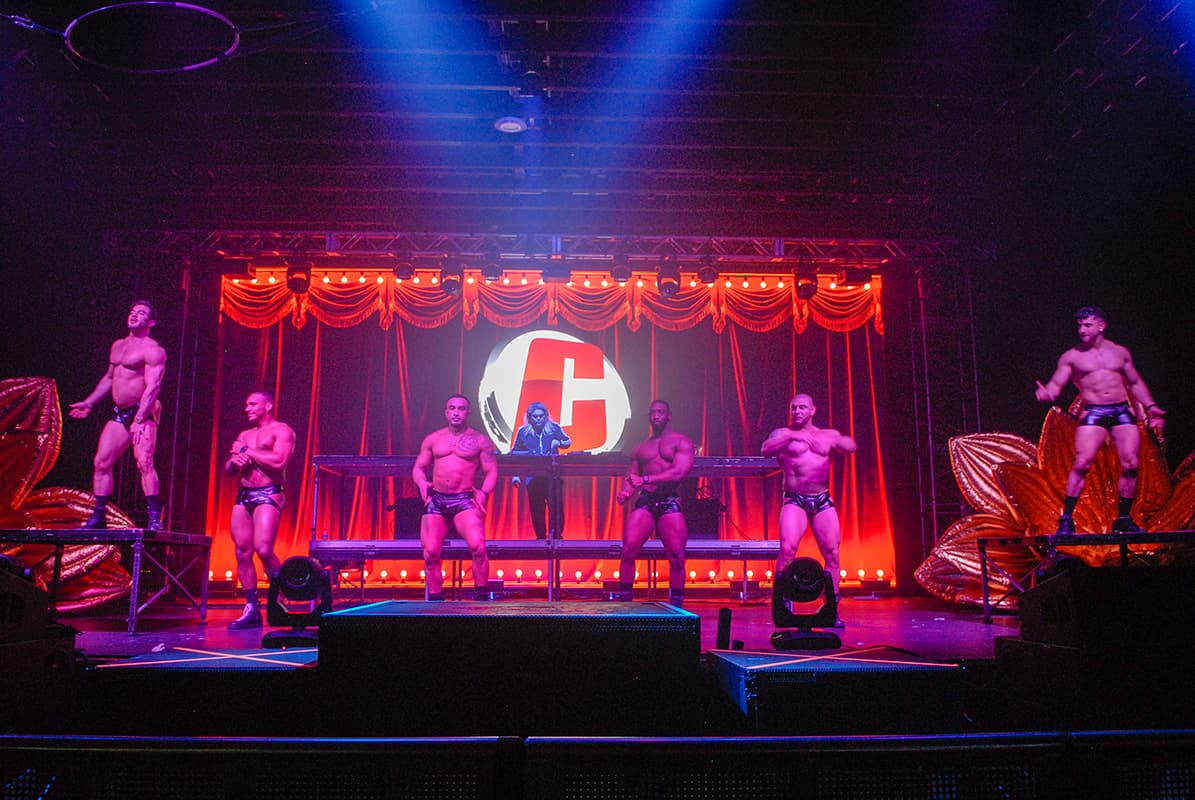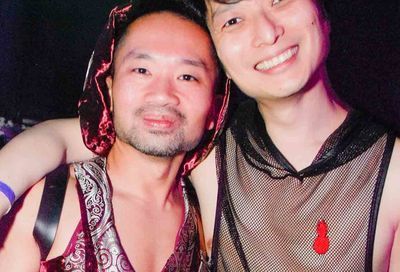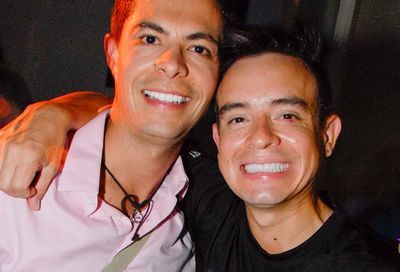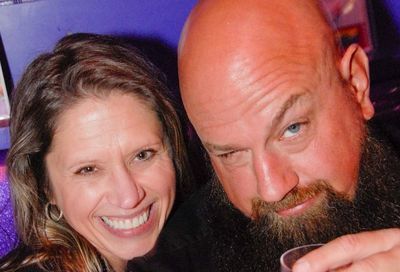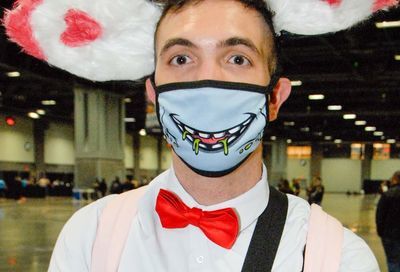Tony Moran Takes to the Booth
Dancing DJ Tony Moran Throws His Hands In The Air
|
Most DJs these days who crave national attention quickly realize they need to branch out into making music, not just playing it. After 14 years away from the DJ booth, Tony Moran slowly realized the opposite is also true.
“As the years go by, I’ve heard so many times that I’m ov-ah,” Moran says, in a thick Brooklyn accent. Or he hears, “I thought you hung your hat up and moved to Key West.”
Or he hears nothing. Because many people don’t realize the talented 39-year-old singer, songwriter, music editor, producer and remixer has been working with many popular artists from the beginning stages of what we call dance music, a client list thant includes Robin S., Donna Summer, Janet Jackson and Kevin Aviance. He also co-wrote and produced over half of Gloria Estefan’s 1998 Gloria!, her most dance-oriented album ever. And the twice Grammy-nominated artist received what he considers a “Harvard”-equivalency education from some of the pioneers of dance music, particularly Arthur Baker, John “Jellybean” Benitez, Shep Pettibone and Junior Vasquez.
So a couple years ago Moran stopped turning down requests to DJ, to reintroduce himself to his fellow gay clubgoers. And to force himself to get out of his studio, to dance and express himself, which he does every time he spins.
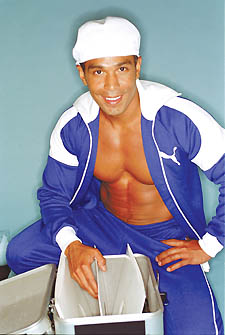 |
“I’m not embarrassed about smiling, about really throwing my hands in the air, about jumping up and down, about falling off the DJ booth, you know what I mean?” he says from his home studio in Manhattan’s Chelsea neighborhood. “I just want to give people a good time and to let them know that I’m having a good time. It’s kind of contagious, I think.”
Count on catching his energy when he plays this Saturday at Nation for Cherry 9.
METRO WEEKLY: There was a period when you weren’t spinning at all.
TONY MORAN: For like fourteen years — it was only about a year and a half ago that I decided I wanted to do it on a regular basis. I’ve always been a DJ but I had focused so many years on just doing studio work. I came to a point where, after recording three albums in a row where I’m basically locked in a room in my recording studio with one or two people, I became a little disenchanted by the whole thing. I was sort of becoming a hermit — it would be six months at a time where I basically didn’t see anybody except my boyfriend. It doesn’t matter what kind of monetary success came from it, it was no longer fulfilling for me [by itself].
MW: So you decided to hit the circuit again?
MORAN: Actually, event promoters and producers were buying [Moran’s Centaur Records compilations] and they started asking if I would play this party or that party. And I would just be like, “No, no, no, I’m not going to do it.” I turned them down for a long time because I don’t want to do something just to do it. Unless I feel like I can do my personal best, then I don’t want to do it. So I turned down a lot of them until I started playing Crobar in Miami and that was just so incredible. I was like, “What have I been missing?”
MW: Describe your approach to DJ-ing. You’ve described it before as working to get the hormones flowing.
MORAN: That’s the way I like to be. I like to see people smiling, jumping around. I like to watch people touch each other — it’s not from a nasty place, I just love to see people sharing their energy with each other. It brings me a lot of satisfaction.
MW: Your first Top 40 hit, the ’80s song “Show Me” by The Cover Girls, had a lot of percussion in it.
MORAN: Right. Because I’m Colombian and Irish, and I was raised in a Spanish ghetto, I was always surrounded by percussion. So when I began making records it just seemed like it needed to be in there. I didn’t do it based on other records that had percussion in it. That whole freestyle sound was kind of revolutionary in that it incorporated very Latin-type melodies and chord progressions along with beats that were not hip-hop but were the driving forces [of the songs].
MW: All the music you’ve written or produced has been dependent on pop vocals. A lot of DJs don’t think it’s cool to play vocals. They see it as trivial.
MORAN: I like to play vocals. Every DJ has the right to kind of express himself in his own way in his sets. But if I based what I was going to do creatively on every opinion that came to me I’d never get a chance to be myself. A DJ came up to me one time when I was in the booth — I’m dancing around the booth, I’ve got my hands in the air, and he’s like, “You know, DJs are not supposed to dance.” And I said to him, “Well, then I guess I’m not a DJ. But I’m still behind the turntables here.”
MW: Are you looking forward to Cherry?
MORAN: I’m really, really excited about doing it. All my friends have gone to it and I’ve met a lot of guys from Washington in all my travels. I have a lot of friends who are meeting me there. I’m going to go and just enjoy myself and hang out. Of course, I’m not going to be totally full-on, because I want to make sure that I’m rested and together. I purposely didn’t take any gigs on other days of that weekend so I could just stay in Washington and be around my friends.
DJ Tony Moran plays at the Cherry 9 Saturday Night Event at Nation, 1015 Half Street SE, 10 p.m. to 6 a.m. Tickets $65 in advance, $70 at door if available. Tickets available at Universal Gear, 1601 17th Street NW, or at the Cherry Welcome Center, Washington Terrace Hotel, 1515 Rhode Island Avenue NW. Visit www.cherryfund.org.
Advertisement
|
Support Metro Weekly’s Journalism
These are challenging times for news organizations. And yet it’s crucial we stay active and provide vital resources and information to both our local readers and the world. So won’t you please take a moment and consider supporting Metro Weekly with a membership? For as little as $5 a month, you can help ensure Metro Weekly magazine and MetroWeekly.com remain free, viable resources as we provide the best, most diverse, culturally-resonant LGBTQ coverage in both the D.C. region and around the world. Memberships come with exclusive perks and discounts, your own personal digital delivery of each week’s magazine (and an archive), access to our Member's Lounge when it launches this fall, and exclusive members-only items like Metro Weekly Membership Mugs and Tote Bags! Check out all our membership levels here and please join us today!







